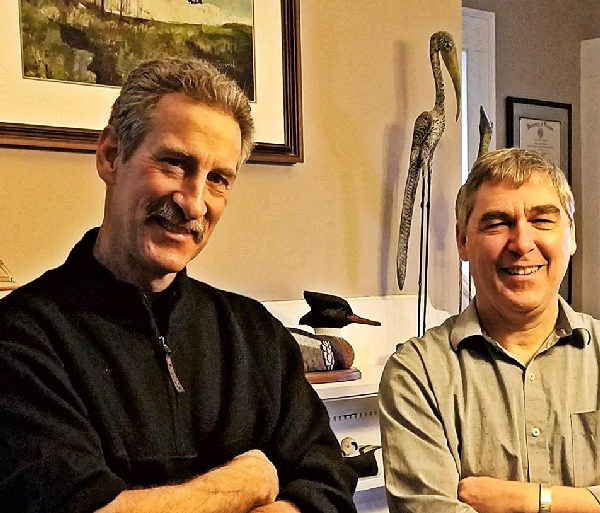We hope that this finds you healthy and that you and your family have remained safe and are making the best of these tenuous times. Please know that we remain open and are continuing to see our patients. We continue to follow all the CDC recommendations for facilities like ours, and the doctors are wearing masks and cleaning hands and surfaces between every patient. If you are experiencing pain, recovering from an injury, or are feeling stressed, please do not hesitate to call for an appointment. We are here and at your service.

Thank you for visiting the website of Brunswick Chiropractors Dr. Thomas Augat and Dr. Michael Noonan at Augat Chiropractic, a professional Brunswick chiropractic clinic. In practice as well as online, chiropractor, Dr. Augat and Dr. Noonan strive for excellence through superior patient treatment, education, and satisfaction.
We are proud to have been chosen "Best of the MidCoast" yearly since the inception of that award.
Dr. Augat has been in practice in Brunswick for 31 years, serving the residents and visitors of Mid Coast Maine and establishing Augat Chiropractic as the area's premier natural healthcare facility. Dr. Michael Noonan joined our practice in 2018 and brought 34 years of experience and expertise in acupuncture and nutrition to our practice. Our experience locally and with elite and professional athletes nationally, as well as our energy and compassion, allows us to afford you the best possible care in this field.

Augat Chiropractic also has a satellite office in Kingfield, Maine serving the people of the western Maine mountains and Sugarloaf Mountain ski resort's athletes, workers, and visitors. For an appointment at our Kingfield office, please call 522-6313 or 725-7177.
Please stay safe. The following is one of a series of articles by Dr. Augat relative to the coronavirus. We will begin sharing some of these with all of you to help you remain healthy.
With the onset of spring comes increased pollen and mold, as well as an expected resurgence of the cold and flu. While we are in the thick of the coronavirus pandemic, any respiratory symptoms are worrisome to each of us as well as anyone around us. In these harrowing times, if you want to elicit a negative response from anyone, just cough or sneeze in public. So, how do you differentiate between the symptoms of the coronavirus versus spring allergies versus the common cold or flu?
Most concisely, the following are the most common symptoms related to each:
- Coronavirus: common coronavirus symptoms include a fever, a dry cough, tiredness, and
shortness of breath and can include runny or stuffy nose and sore throat.
- Allergies: common allergy symptoms tend to be more chronic and include sneezing, wheezing, and coughing, as well as a runny nose and/or stuffy nose, postnatal drip, and itchy eyes/mouth/face.
- Influenza: the flu usually includes fever, coughing, sneezing, runny or stuffy nose, fatigue/malaise, and can include a headache, a sore throat, nausea, and diarrhea, but no shortness of breath.
- Colds: the common cold is characterized by sneezing, coughing, a stuffy nose, a sore throat, and can include chest discomfort, body aches, and fatigue.
The defining symptom of COVID-19 is that of shortness of breath. Generally, this does not tend to occur with allergies, colds, or flu. Influenza symptoms are quite easy to confuse with those of the coronavirus. Still, the shortness of breath that generally appears within 5-10 days after the first sign of fever with coronavirus is uncommon with the flu. There are other symptoms relative to coronavirus that are not consistent but have been reported by some, including loss of taste and/or smell.
In most cases, these symptoms are mild and do not advance to the point of being life-threatening. The CDC advises that you seek medical attention if you have any of the following symptoms: significant difficulty breathing, persistent pain or pressure in your chest, new confusion, or bluish lips or face. If you suspect that you may have the coronavirus, you need to self-isolate and have people leave food and supplies outside your door. Making sure that no one touches anything you have been in contact with and does not enter your living space is critical to their health and ability to avoid contracting this virus.
My recommendation is that you exercise maximum precaution if you develop any respiratory symptoms, despite the likelihood that these may be due to allergies, colds, or the flu. Better safe than sorry. We do know that there are likely many people that are minimally symptomatic walking amongst us that may well be carrying and transmitting the coronavirus. If you have any of the above symptoms, just stay home. Continue to practice the recommended precautions, including wearing a facemask, frequently washing your hands, avoiding touching your face, and disinfecting surfaces and items in your home.